The supreme justice of Egypt's Supreme Constitutional Court has been sworn in as the nation's interim president, replacing the Islamist Mohamed Morsi who was ousted by the military.
Adli Mansour was sworn in Thursday at the Constitutional Court in a ceremony broadcast live on state television.
Related stories:
- Obama orders US to review aid to Egypt
- Egyptian army deposes Morsi, deadly clashes erupt
- Deadline for Morsi expires, Egypt military tightens grip
According to military decree, Mansour will serve as Egypt's interim leader until a new president is elected. A date for that vote has yet to be set.
Mansour said he planned to hold new elections, but did not specify when.
He said Egypt had "corrected the path of its glorious revolution" through mass street protests calling for Morsi's resignation, which ultimately sealed his fate.
Egypt's army was holding ousted President Mohamed Morsi at a military facility in Cairo on Thursday and other Muslim Brotherhood leaders were arrested in a crackdown on the movement that won several elections last year.
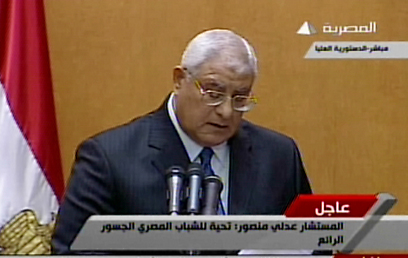
Adli Mansour being sworn in (Photo: Reuters)
The United Nations, the United States and other world powers did not condemn Morsi's removal as a military coup. To do so might trigger sanctions. Army intervention was backed by millions of Egyptians, including liberal leaders and religious figures who expect new elections under a revised set of rules.
But as vast crowds partied on Cairo's Tahrir Square, hailing a "second revolution" to match the overthrow of Hosni Mubarak in 2011, Islamists feared a clampdown that revived memories of their sufferings under the old, military-backed regime. At least 14 people were killed and hundreds wounded in street clashes.
Television stations sympathetic to Morsi were taken off air.
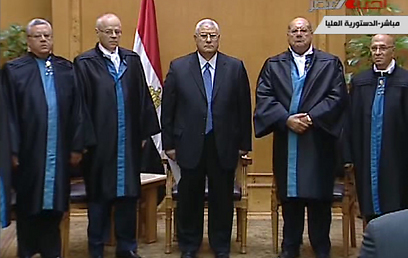
Swearing in ceremony (Photo: AP)
Morsi himself was transported to the Defense Ministry, Brotherhood spokesman Gehad El-Haddad told Reuters. His aides were being held at the Republican Guard barracks where he spent his final day in office defying calls for him to resign but unable to forestall an ultimatum from the generals.
The fall of the first elected leader to emerge from the Arab Spring revolutions raised questions about the future of political Islam, which only lately seemed triumphant. Deeply divided, Egypt's 84 million people find themselves again a focus of concern in a region traumatized by the civil war in Syria.
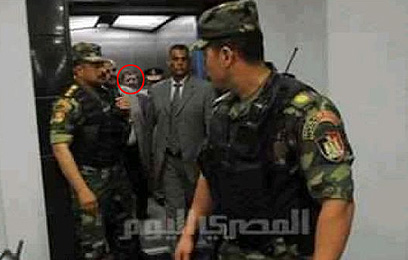
Morsi taken to Republican Guard HQ
Straddling the Suez Canal and a key piece in the security of Israel, many powers have an interest in Egypt's stability.
The army put combat troops and tanks on the streets around a gathering of hundreds of Morsi's supporters in Cairo. The military said it would keep order. Morsi called for there to be no violence.
United Nations Secretary-General Ban Ki-moon urged a swift return to civilian rule, restraint and respect for civil rights.
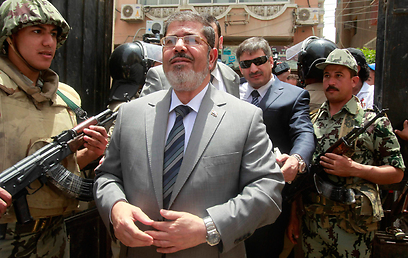
Morsi in better days. Election Day, 2012 (Photo: Reuters)
He did not, however, condemn the military action. He said: "Many Egyptians in their protests have voiced deep frustrations and legitimate concerns ... At the same time, military interference in the affairs of any state is of concern."
US President Barack Obama, whose administration provides $1.3 billion a year to the Egyptian military, expressed concern about Morsi's removal and called for a swift return to a democratically elected civilian government. But he, too, stopped short of condemning a military move that could block US aid.
"During this uncertain period, we expect the military to ensure that the rights of all Egyptian men and women are protected, including the right to peaceful assembly, due process, and free and fair trials in civilian courts," he said.
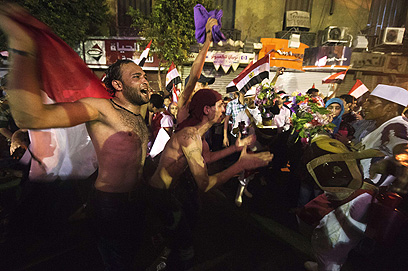
Celebrations in Cairo lasted well into the night (Photo: AFP)
Obama urged the new authorities to avoid arbitrary arrests and said US agencies would review whether the military action would trigger sanctions on aid. A senator involved in aid decisions said the United State would cut off its financial support if the intervention was deemed a military coup.
Much may depend on a strict definition of "coup."
Concerns over human rights have clouded US relations with Cairo, but did not stop aid flowing to Mubarak, or to Morsi.
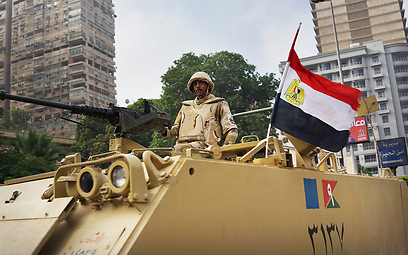
Army in Cairo (Photo: Getty Images)
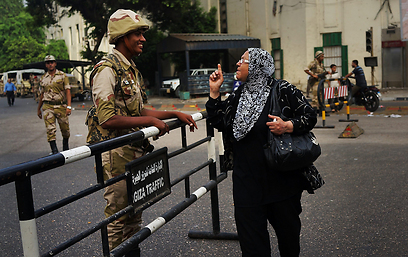
Cairo, Thursday morning (Photo: Getty Images)
The European Union, the biggest civilian aid donor to its near neighbor, also called for a rapid return to the democratic process. Foreign policy chief Catherine Ashton said in a statement that should mean "free and fair presidential and parliamentary elections and the approval of a constitution."
She stressed the need for inclusive politics but did not mention the constitution and elections already held in the past two years, whose results the armed forces have now cast aside.
AP and Reuters contributed to this report
- Receive Ynetnews updates
directly to your desktop















